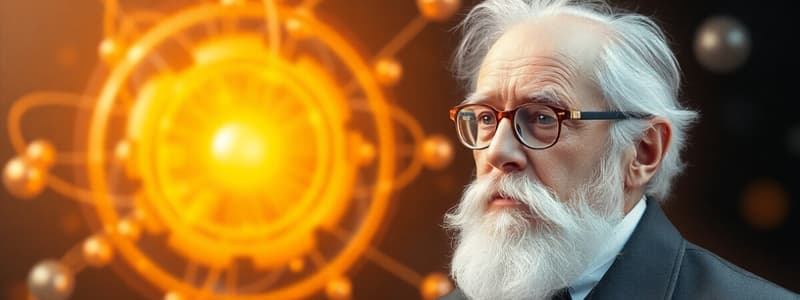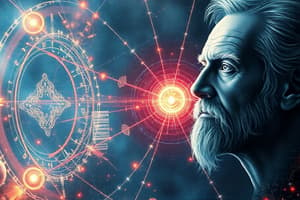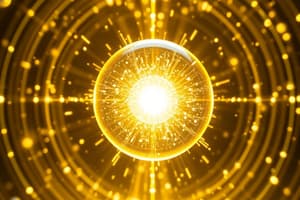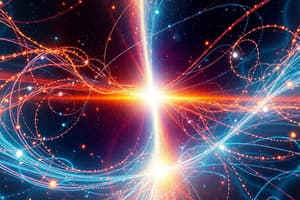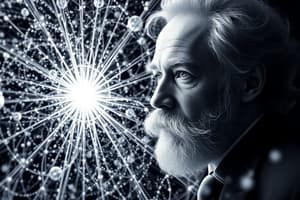Podcast
Questions and Answers
What prompted Max Planck to initially delve into the study of physics?
What prompted Max Planck to initially delve into the study of physics?
- The need to explain black body radiation propelled him into physics.
- His aptitude for mechanics and mathematics naturally led him to physics.
- His doctoral thesis on thermodynamics required in-depth physics knowledge.
- A tutor ignited his curiosity and interest in the field. (correct)
At which university did Max Planck conduct the majority of his research on heat theory?
At which university did Max Planck conduct the majority of his research on heat theory?
- Maximilian Gymnasium
- University of Munich
- Kiel University (correct)
- University of Berlin
What specific problem in physics did Max Planck primarily address with his concept of energy quanta?
What specific problem in physics did Max Planck primarily address with his concept of energy quanta?
- The photoelectric effect
- Thermodynamic equilibrium in isolated systems
- The behavior of black body radiation (correct)
- The nature of relativity
Which of Planck's accomplishments occurred last chronologically?
Which of Planck's accomplishments occurred last chronologically?
What concept was Max Planck credited with introducing to the field of physics?
What concept was Max Planck credited with introducing to the field of physics?
What is a 'black body' in the context of Planck's work?
What is a 'black body' in the context of Planck's work?
What aspect of Max Planck's childhood might have influenced his educational trajectory?
What aspect of Max Planck's childhood might have influenced his educational trajectory?
Planck extensively researched the vibration frequencies of atoms, particularly during his study of?
Planck extensively researched the vibration frequencies of atoms, particularly during his study of?
How did Max Planck demonstrate his support for Albert Einstein?
How did Max Planck demonstrate his support for Albert Einstein?
What year was pivotal for Planck due to the unveiling of the radiation distribution law, integrating the groundbreaking concept of energy quanta?
What year was pivotal for Planck due to the unveiling of the radiation distribution law, integrating the groundbreaking concept of energy quanta?
Flashcards
Max Planck
Max Planck
A German physicist who altered the understanding of the subatomic world.
Energy Quanta
Energy Quanta
Discrete packets of energy introduced by Planck in radiation theory.
Black Body
Black Body
A theoretical body that absorbs all electromagnetic radiation.
Nobel Prize in Physics 1919
Nobel Prize in Physics 1919
Signup and view all the flashcards
Maximilian Gymnasium
Maximilian Gymnasium
Signup and view all the flashcards
University of Berlin
University of Berlin
Signup and view all the flashcards
Heat Theory Work
Heat Theory Work
Signup and view all the flashcards
Radiation Distribution Law
Radiation Distribution Law
Signup and view all the flashcards
Support of Einstein's Theory
Support of Einstein's Theory
Signup and view all the flashcards
Second Law of Thermodynamics
Second Law of Thermodynamics
Signup and view all the flashcards
Study Notes
Max Planck's Quantum Theory
- Max Planck, a German physicist, proposed a quantum theory of energy.
- His theory challenged classical physics by proposing that energy is emitted in discrete packets called "quanta" rather than continuously.
- This fundamentally altered the understanding of the subatomic world.
Planck's Early Life and Education
- Born in Kiel, Germany, and was the youngest of six children.
- Moved to Munich at age 9.
- Attended Maximilian gymnasium, displaying aptitude in mechanics, mathematics, and music.
- A physics tutor ignited his interest in physics.
- Earned a doctoral degree in physics from the University of Munich.
- Became a professor of theoretical physics at the University of Berlin in 1889.
- Remained at the University of Berlin until his retirement in 1926.
Blackbody Radiation
- Physicists struggled to explain how black bodies absorb and emit light.
- A black body, defined by Gustav Kirchhoff, absorbs all electromagnetic radiation falling on it.
- Black bodies emit electromagnetic waves across a range of wavelengths (including visible, ultraviolet, and infrared).
- Experiments showed that the wavelengths radiated by heated objects didn't match classical thermodynamic predictions.
- Planck focused his research in 1894 on blackbody radiation, trying to link theory with observation.
Planck's Breakthrough
- Planck investigated blackbody radiation, calculating vibration frequencies of atoms in the 1890s. This led to his groundbreaking work.
- In 1900, Planck introduced the concept of energy quanta, a pivotal idea in physics.
- Planck's radiation law explained the observed distribution of energy in blackbody radiation.
Impact on Einstein and Others
- Einstein, a contemporary of Planck, was supported by Planck. Planck helped promote Einstein's work in Germany.
- Planck created a new professorship specifically for Einstein at the University of Berlin in 1914.
- Planck's work formed a basis for modern concepts of quantum theory.
Recognition
- Planck received the Nobel Prize in Physics in 1919 for his discovery of energy quanta.
Studying That Suits You
Use AI to generate personalized quizzes and flashcards to suit your learning preferences.
